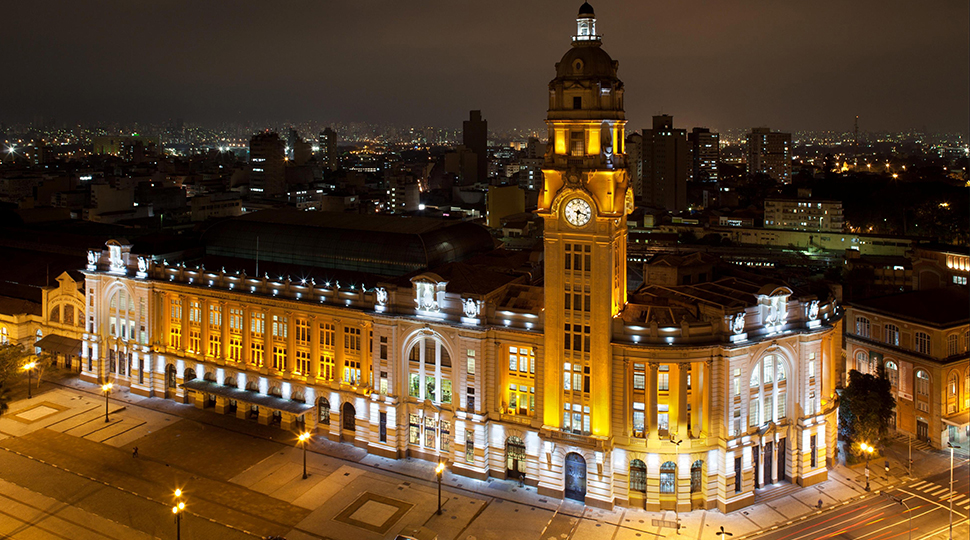We spoke to Charlotte Hamilton, Development and Communications Manager for the European Union Youth Orchestra, about her recent experiences in South America as part of the British Council’s Transform Orchestral Leadership Programme.
Charlotte spent two weeks at Orquestra Sinfônica do Estado de São Paulo Foundation, working alongside the team responsible for ensuring the success of one of the largest and best known orchestras in South America. During this time she also had the opportunity to visit and witness the work of Projeto Guri, considered to be one of the largest social and cultural programmes in Brazil addressing dramatic cases of social exclusion, poverty and lack of opportunities through music.
“I applied for Transform Orchestra Leadership in the hope that I would be confronted by a different classical music scene, audience reality and funding landscape. As a fluent Portuguese speaker I was confident I could garner much from shadowing people, learning how they deal with some of the sector’s key concerns: how to attract new audiences, retain the faithful and raise much needed finance from the private sector to sustain their business model. My expectations were met, but perhaps not in the ways I had envisaged …
“To be faced with such a different set of problems and concerns, yet hear the same key words and phrases used in meetings, I became acutely aware of how lazy I had become. I don’t mean I don’t work hard; anyone in the Arts knows we all do. I mean our brains become accustomed to a style of working and a way of thinking. Even when we brainstorm and believe we are thinking differently, all too often we aren’t doing anything of the sort. Perhaps we have a tendency to envelop existing ideas in our own corporate colours and in endless ‘informal’ classical music performances and cross-genre projects. More often than not, we are comfortable assuming an audience of sorts and tend to focus more on delivery. In Brazil, much deeper reflection is required on how to physically get audiences to attend performances; there are travel, safety and affordability issues to name just three.
By stepping outside of our comfort zone, we are forced to make sense of a completely new set of parameters and challenges
“A change of perspective is always a good thing. By stepping outside of our comfort zone, we are forced to make sense of a completely new set of parameters and challenges. I learnt to question the ease with which we take decisions around communications and orchestrate (pun intended) sponsorship approaches. This is not to say these are easy areas in the UK or in Europe, but rather that one can become intellectually complacent when faced with certain givens and facilities. In Brazil, orchestras are challenged by their environment, the diversity of their population and a highly competitive funding landscape. There is tremendous need for innovation and targeted sponsorship approaches. I felt that I became more sensitive to ‘forgotten’ communities and intend to feed this back into my work in the UK.
“On my last day at OSESP I presented my organisation, the European Union Youth Orchestra, and our global T2020 project to a sizeable audience drawn from all departments of the Hall and Foundation , as well as a handful of young players from one of GURI ’s youth orchestra projects. I have the great privilege of being part of a ten person team that works with 120 young classical musicians (drawn from all 28 EU Member States touring for almost three months each year) and co-coordinates the European Music Campus with our Summer Home & Principal Venue Partner Grafenegg, a smaller European Music Campus Orchestra of 60, ten Leverhulme Summer School players and a plethora of smaller ad hoc projects throughout the year with our ten international partners and 35 associate partners worldwide. I wanted to impart some of my enthusiasm for those I had called colleagues for two weeks. I never imagined I could offer much to my Brazilian friends. I came with an open mind and a willingness to learn from them, to share what little I could. At the end of the session a younger member of staff with whom I had barely interacted approached me. Embarrassed, she thrust some chocolates into my hand with a brief note attached and hurried off. As I packed up my work and prepared to head off to the airport I opened her note. It read: "Thank you, for reminding me what it is to feel passionate about our work." What she didn’t realise is this exchange had afforded me much needed time and space to reboot, creatively and culturally. I have always believed, and evermore so now: our doors must always be open; we have much to learn.”
– Charlotte Hamilton


